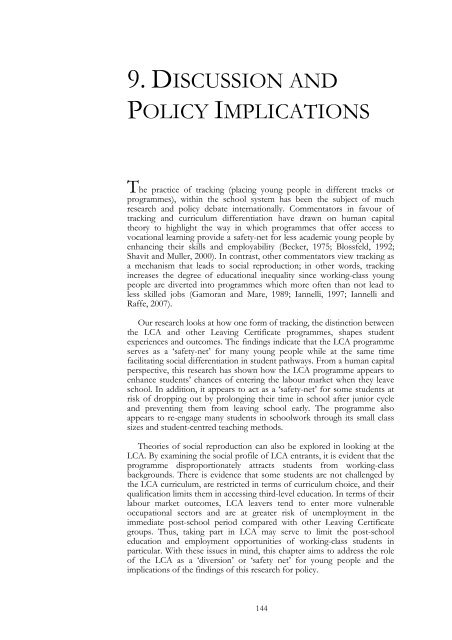Student Experiences of the Leaving Certificate Applied Programme
Student Experiences of the Leaving Certificate Applied Programme
Student Experiences of the Leaving Certificate Applied Programme
You also want an ePaper? Increase the reach of your titles
YUMPU automatically turns print PDFs into web optimized ePapers that Google loves.
9. DISCUSSION ANDPOLICY IMPLICATIONSThe practice <strong>of</strong> tracking (placing young people in different tracks orprogrammes), within <strong>the</strong> school system has been <strong>the</strong> subject <strong>of</strong> muchresearch and policy debate internationally. Commentators in favour <strong>of</strong>tracking and curriculum differentiation have drawn on human capital<strong>the</strong>ory to highlight <strong>the</strong> way in which programmes that <strong>of</strong>fer access tovocational learning provide a safety-net for less academic young people byenhancing <strong>the</strong>ir skills and employability (Becker, 1975; Blossfeld, 1992;Shavit and Muller, 2000). In contrast, o<strong>the</strong>r commentators view tracking asa mechanism that leads to social reproduction; in o<strong>the</strong>r words, trackingincreases <strong>the</strong> degree <strong>of</strong> educational inequality since working-class youngpeople are diverted into programmes which more <strong>of</strong>ten than not lead toless skilled jobs (Gamoran and Mare, 1989; Iannelli, 1997; Iannelli andRaffe, 2007).Our research looks at how one form <strong>of</strong> tracking, <strong>the</strong> distinction between<strong>the</strong> LCA and o<strong>the</strong>r <strong>Leaving</strong> <strong>Certificate</strong> programmes, shapes studentexperiences and outcomes. The findings indicate that <strong>the</strong> LCA programmeserves as a ‘safety-net’ for many young people while at <strong>the</strong> same timefacilitating social differentiation in student pathways. From a human capitalperspective, this research has shown how <strong>the</strong> LCA programme appears toenhance students’ chances <strong>of</strong> entering <strong>the</strong> labour market when <strong>the</strong>y leaveschool. In addition, it appears to act as a ‘safety-net’ for some students atrisk <strong>of</strong> dropping out by prolonging <strong>the</strong>ir time in school after junior cycleand preventing <strong>the</strong>m from leaving school early. The programme alsoappears to re-engage many students in schoolwork through its small classsizes and student-centred teaching methods.Theories <strong>of</strong> social reproduction can also be explored in looking at <strong>the</strong>LCA. By examining <strong>the</strong> social pr<strong>of</strong>ile <strong>of</strong> LCA entrants, it is evident that <strong>the</strong>programme disproportionately attracts students from working-classbackgrounds. There is evidence that some students are not challenged by<strong>the</strong> LCA curriculum, are restricted in terms <strong>of</strong> curriculum choice, and <strong>the</strong>irqualification limits <strong>the</strong>m in accessing third-level education. In terms <strong>of</strong> <strong>the</strong>irlabour market outcomes, LCA leavers tend to enter more vulnerableoccupational sectors and are at greater risk <strong>of</strong> unemployment in <strong>the</strong>immediate post-school period compared with o<strong>the</strong>r <strong>Leaving</strong> <strong>Certificate</strong>groups. Thus, taking part in LCA may serve to limit <strong>the</strong> post-schooleducation and employment opportunities <strong>of</strong> working-class students inparticular. With <strong>the</strong>se issues in mind, this chapter aims to address <strong>the</strong> role<strong>of</strong> <strong>the</strong> LCA as a ‘diversion’ or ‘safety net’ for young people and <strong>the</strong>implications <strong>of</strong> <strong>the</strong> findings <strong>of</strong> this research for policy.144

















